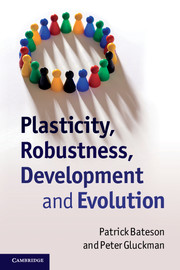Book contents
- Frontmatter
- Contents
- Preface
- Acknowledgements
- 1 Setting the scene
- 2 Clarifications
- 3 Developmental robustness
- 4 Plasticity
- 5 Integration of robustness and plasticity
- 6 Current function of integrated developmental processes
- 7 Evolution of developmental processes
- 8 Impact of developmental processes on evolution
- 9 Development and evolution intertwined
- References
- Index
7 - Evolution of developmental processes
Published online by Cambridge University Press: 05 August 2011
- Frontmatter
- Contents
- Preface
- Acknowledgements
- 1 Setting the scene
- 2 Clarifications
- 3 Developmental robustness
- 4 Plasticity
- 5 Integration of robustness and plasticity
- 6 Current function of integrated developmental processes
- 7 Evolution of developmental processes
- 8 Impact of developmental processes on evolution
- 9 Development and evolution intertwined
- References
- Index
Summary
Evolution is a fact. No serious biologist disputes that organisms have changed over time or that they continue to change. Other organisms have become extinct, many of them in recent times. What requires explanation is the way in which these changes take place. Darwin observed that members of a species differ from each other, that some were more likely to survive and reproduce than others, and finally that the characteristics of the fitter individuals would generally be inherited by their offspring. So, by the process he metaphorically termed ‘natural selection’, lineages would evolve. Like his contemporaries, Darwin knew nothing of the molecular processes of inheritance and was often tempted into supposing that acquired characters could be inherited, arguing for example that behaviour patterns that are learned generation after generation will eventually be expressed without being learned. In the mid-twentieth century, the genetic mode of inheritance which had become established at the beginning of the century was brought together with Darwin's evolutionary theory in what was called at the time the Modern Synthesis. This conceptual framework became the dominant mode of biological thought, emphatically reinforced by the culture of genetic determinism that has accompanied the explosion of genomic knowledge.
Evolutionary theory itself continues to evolve, integrating the views of the Modern Synthesis with the explosion of observation and theory coming from the developmental, ecological and molecular sciences (Pigliucci and Müller,2010). Other mechanisms of inheritance have been discovered.
- Type
- Chapter
- Information
- Plasticity, Robustness, Development and Evolution , pp. 81 - 98Publisher: Cambridge University PressPrint publication year: 2011



